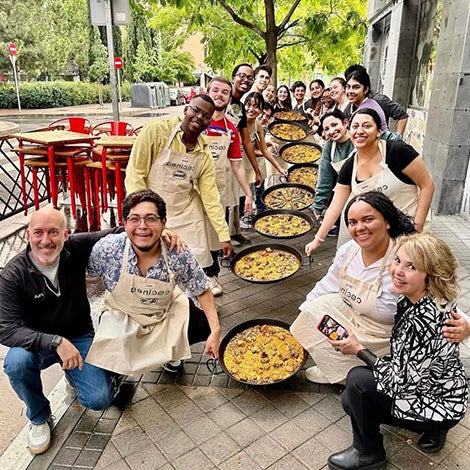- Welcome
- Chair's Note
- A Little Bit of History
- Mission Statement
- Faculty News
- Student News
- Alumni News
- Events Highlights and Community Outreach
- Rice Goes to the Grand Opera
- Study Abroad
- Awards and Fellowships
- Acknowledgments
- Stay in Touch
Welcome
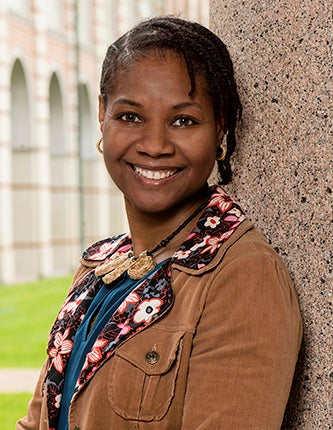
I'm excited to bring you the first issue of our departmental newsletter. It explores a little bit of the history of the Department of Modern and Classical Literatures and Cultures (it's complicated!) and an overview of what's been happening within MCLC this past year. For some of you, many things have changed since you last visited campus; one thing that has never changed is our dedication to faculty and students' excellence. -- Jacqueline Couti (Chair of MCLC 2022-to present)
Welcome to our Growing Department
Starting in the fall of 2022 as the new chair was all the more exciting and inspiring because I was in excellent company with the new president of Rice, Reginald DesRoches, and a new administration in Allen Center. Under this new administration, I also had the opportunity to recruit three new lecturers.
The Department of Modern and Classical Literatures and Cultures (MCLC) came into existence in the fall of 2020, when the former Department of Classical and European Studies (created in 2015) and the former Department of Spanish, Portuguese and Latin American Studies (created in 2015) joined forces, and their faculty decided to work more closely to become a global powerhouse at Rice. The goal was to better prepare for the new challenges that the Humanities faced and continue to face. We did not expect the pandemic, which pushed us to reinvent ourselves even faster and work together in many different ways. Colleagues designed strategies to make sure students were more engaged than ever. We kept introducing them to the world even in the summers of 2020 and 2021, when students could not travel with our study abroad programs.
It has been an exciting and challenging time to belong to and work in an interdisciplinary, intellectually vibrant, student-friendly, and research-centered department that is home to six programs: Classical Studies, European Studies, French Studies, German Studies, Latin American and Latinx Studies, and Spanish and Portuguese. Each of these programs has its own major. We also provide six minors: Classical Civilizations, Greek Language and Literature, Latin Language and Literature, French Studies, German Studies, and Spanish and Portuguese. We have supportive and efficient staff who also help us further our mission. We are a growing department, and we intend to be a powerhouse.
Due to our interest in interdisciplinarity and making connections with others within and outside our department, we work often (and well!) with other departments at Rice. The 2021 international hybrid conference “In the Path of Disaster(s)” demonstrated our desire and capacity to adapt and thrive in challenging times and to work across disciplines and collaborate with each other. Envisioned by Jacqueline Couti and created in collaboration with Luis Duno-Gottberg, this conference exemplified how MCLC faculty could work better together and with colleagues from other departments. Luis Duno-Gottberg and Gisela Heffe as well as our colleague in English, Nicole A. Waligora-Davis, had the opportunity to chair sessions. The conference was sponsored by the Center for African and African American Studies, the Center for Environmental Studies, the School of Humanities, the Humanities Research Center, the Mellon Foundation-sponsored Diluvial Houston grant and by and Creative Ventures and Loyola University, New Orleans. Without further ado, I would like to introduce you to MCLC: its mission and its people.
Chair's Note
I am so privileged to be able to share with you the many ways that MCLC faculty play their part in bringing the "global" to Rice University and the School of Humanities. We embody our motto: Engaged, Challenging, Global, as challenges are always an opportunity for change and improvement. MCLC has developed close relationships with the Department of Transnational Asian Studies and the Center for Languages and Intercultural Communication and other areas such as the Initiative for the Study of LatinX America, the Center for Environmental Studies, the Department of Art History, the Program in Medical Humanities and the Center for the Study of Women, Gender and Sexuality, and is looking forward to more collaboration. We were fortunate to hire one tenure-track faculty and three lecturers in the past year, and the talent of our faculty, including Sophie Esch, Esther Fernández, Gisela Heffe and Julie Fette, has been recognized by their peers and various institutions nationally or internationally with book awards and academic fellowships. We are recovering from the pandemic, and our number of majors and minors are increasing due to the tireless job of program advisors and talented and dedicated professors.
However, as I type this note - with a cat sleeping on my hands, if not my keyboard - I am reminded of how some things change and others do not. In the summer of 2020, my cat sleeping on my hands while I was typing was reassuring and grounding as I immersed myself in work and tried to forget about the scary world around me. I could not have envisioned myself as a chair, particularly in a world that was so reshaped by a pandemic. The academic year 2020-21, I saw my students’ faces on Zoom as they diligently attended every class no matter the time zone they were in and realized that what I and my colleagues offered them during that difficult time was not escapism but a way to anchor themselves in this new normal. They came to class to learn, to connect and to go beyond boundaries, and this is what we offered to them: the global within each of us.
Sitting in front of our screens discussing fairy tales and folktales in a transatlantic triangulation between Europe, Africa and the Americas was challenging in many ways. Some of these stories and their creation are not for the faint-hearted; Charles Perrault and the Brothers Grimm had few filters. By the time we examined tales from West Africa and the Americas, students had thoroughly revisited their assumptions about the human condition: as humans, we are not always the best version of ourselves. Discussing history, colonialism, slavery, violence, despair and oddly enough hope in those various tales and folktales was rather unsettling but comforting. Students were the ones to explore hope the most, surprisingly enough. We realized that, as far as the pandemic was concerned, it too would pass. At the end of that first pandemic semester, students wrote the most beautiful, dark and poignant tales so full of sorrows. They embraced their fears and made beauty out of them.
What has remained similar between the summers of 2020 and 2023, apart from the cat on my arms, is my and our ability to stay connected to the local, international and global. Thank goodness for the Internet and technology despite their shortcomings! Beyond technology, what connects us across borders, across the sea, across political affiliations or religious beliefs are the human, the unknown, and the uncertainty of life. The pandemic and its aftermath have shown that there is much to learn about putting broken pieces back together during challenging times in the most beautiful ways. From the beginning of the pandemic through this most recent academic year, my students and I stretched our minds and boundaries through books, ideas and human interaction. My colleagues did the same with their students. This is what MCLC faculty have to offer to our students, colleagues, and anyone who enters into contact with us: we put the human back in the Humanities. We teach our high-achieving students to be more generous with themselves and others. We also teach students to deal with the unexpected. Despite so many lives lost, my colleagues and I are still here to educate and share our knowledge with students. So this newsletter aims to celebrate life while we still hold in our memory the people who are no longer with us.
A Little Bit of History
Some of you may wonder what MCLC is. Indeed, the previous departments and programs that were merged into this new department have a long and complicated, even confusing, history. Looking at the evolution of the French and German Studies programs, among others, the only certainty is change, as demonstrated by a trip down memory lane, courtesy of Rice Thresher.
In 1912, Rice, then known as Rice Institute, created a humanities program and offered courses in Latin, French, Spanish, German, philosophy, history, poetry, psychology and English. Thomas Lindsay Blayney, a professor from Centre College (Danville, Kentucky) was recruited to teach German and became Rice’s first humanities professor. He was the first head of the German department too, until 1924, although the German Club was created in 1916 by female students. In the early 1960s, the German Department became the Department of German and Russian, which it stayed until the late 1980s before reverting to its previous name.
As for French, from 1913 to 1924, Dr. Guerard was the Head of the French Department. In April 1930, the French Department and the French Club, Club Hiboux at the time, were forces to be reckoned with on campus, as they were very active and enriched the scholarly life of Rice. For instance, the arrival of André Bourgeois was celebrated on November 9, 1928 and his becoming the first Favrot endowed chair after teaching 40 years at Rice was also noted in 1969.
In 1960, the Foreign Languages Department integrated French, German, Italian, Spanish, Latin and Greek. Interestingly enough, it was short-lived: it dissolved in 1964, when there was a new plan to redesign the departments of the Liberal Art College. At that point, Greek, Latin, Spanish, Italian and Russian were supposed to be placed in a department of their own, the Language Department, chaired by James A. Castañeda. French and German, which had doctoral programs, were supposed to become two distinct programs. However, in 1965, the death of the Department of Foreign Languages gave birth to the Department of German and Russian and the Department of French and Italian. These configurations were also short-lived. The Department of German and Russian became the Department of German and Slavics in the fall of 1987. Eventually, the Department of French and Italian became the Department of French Studies in the fall of 1991. In the Spring of 2010, the Department of French Studies lost its master’s and doctoral programs. Similarly the Department of Spanish, Portuguese and Classics, probably created in the 1970s, and very vibrant between 1985 and 1992, became the Department of Hispanics and Classics in 1992 and the Department of Hispanics in 2004. All that to say that at Rice, the only constant is change and reorganization of academic units. This quick little history should serve as a reminder that no matter the name of the units, the programs within MCLC have a long and glorious history at Rice.
Mission Statement
We encourage responsible and inclusive citizenship in our students as we prepare them for local or international careers that require an adventurous, adaptable and creative mindset. Students learn transformative skills that enable them to better effect change in the world and create their own unconventional paths. Our programs foster an intellectually lively and culturally diverse community where teaching and research explore critical questions around aesthetics, ethics, and politics.
Faculty News
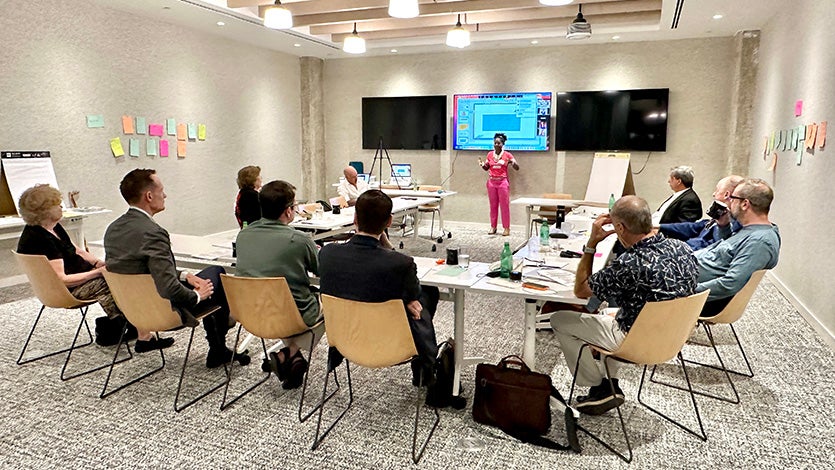
Martin Blumenthal-Barby
Professor of German Studies
Martin Blumenthal-Barby was promoted to full professor. In his latest monograph, Arendt, Kant, and the Enigma of Judgment (Northwestern University Press, October 2022), Blumenthal-Barby offers a "nuanced extrapolation of Hannah Arendt’s theory of judgment through her highly provocative reading of Immanuel Kant." For more, click here.
Jacqueline Couti
Professor Laurence H. Favrot in French Studies
Jacqueline Couti’s new scholarship has been featured at Rice and beyond, nationally and internationally. Her book Sex, Sea, and Self (Liverpool University Press, 2021) was featured in Rice Magazine in the summer of 2022. She also published a new edition of the white Creole René Bonneville’s first serialized novel, Un fruit défendu, featured in the French news, in “Rentrée littéraire Outre-mer.” Most recently, she had the pleasure to invite the renowned dancer and choreographer Lēnablou, who completed her Villa Albertine residency at Rice University in March 2023. Contributing to a network for arts and ideas spanning France and the United States, Lēnablou worked throughout her residency with Rice students, faculty, and artists from the greater Houston community around what she terms bigidi, how the body of the Caribbean dancer, in a state of permanent imbalance, adapts to chaos.
Luis Duno-Gottberg
Lee Hage Jamail Professor
Luis Duno-Gottberg served as Juror in the José Donoso International Literary Prize, Chile 2022 and was one of the 2023 IES Abroad Faculty-Led Program Awards winners. He also worked with students Ben Murdoch (undergraduate) and Emile Chamoun-Farah (graduate) to complete the first rendition of Visualizing Disaster, a geo-location platform aiming at producing a visual archive of catastrophic natural events in Latin America and the Caribbean. Additionally, he published several articles, among which “Cismas y sismos del latinoamericanismo y la cuestión de la subalternidad: Un homenaje al pensamiento de John Beverley,” A Contracorriente 19, no. 2 (2022): 257-64, and “¿Precariato revolucionario o las turbas del rey? Nuevos sujetos de la política venezolana y soberanía lumpen (notas para pensar un nuevo pueblo),” Revista Espacio Abierto 31, no. 2 (2022): 121-37.
Christian Emden
Frances Moody Newman Professor of German Studies
Christian Emden just completed his one-year term as chair of the Department of Philosophy. He also presented a keynote at a big conference, “Naturnotwendigkeiten: Nietzsche über Normativität” (Natural Necessities: Nietzsche in Normativity), keynote lecture, 32nd International Nietzsche Congress, Nietzsche’s Natures, Naumburg/Saale, Germany (October 20-23, 2022), as well as a paper on contemporary issues in political theory at the Turkish-German University in Istanbul. No longer a chair, Emden can stop and smell the roses, meaning working on his three books in progress: one on nihilism, one on Hannah Arendt and the American empire, and a short one on community, the common, and normative democratic theory.
Sophie Esch
Associate Professor of Latin American and Latinx Studies
Sophie Esch is currently an Alexander von Humboldt Fellow (2022-24). Esch’s book, Letra y metralla: cultura y política durante los periodos de conflictos armados en México y Centroamérica (1910-2020), trans. Lorena Murillo Saldaña (Bonilla Artiga Editores, 2022), has won the 2023 Premio Iberoamericano of the Latin American Studies Association, LASA's highest honors for a book published in Spanish. The book is a translation of Esch's 2018 monograph, Modernity at Gunpoint: Firearms, Politics, and Culture in Mexico and Central America (University of Pittsburgh Press, 2018).
Esther Fernández
Associate Professor of Iberian Studies
Esther Fernández was awarded the 2022-2023 Biruté Ciplijauskaité Fellowship in Spanish Literature of the Iberian Peninsula by the Institute for Research in the Humanities at the University of Wisconsin-Madison. She will be in residence for the academic year 2023-2024. Fernández's book To Embody the Marvelous: The Making of Illusions in Early Modern Spain (Vanderbilt University Press, 2021) has received two awards: the 2023 Nancy Staub Publications Award (UNIMA-USA) and the 2023 Vern Williamsen Comedia Book Prize (Association for Hispanic and Classical Theater). She also recently edited two volumes, Daring Adaptations, Creative Failures, and Experimental Performances in Iberian Theater, with María Chouza-Calo and Jonathan Thacker (Liverpool UP, 2023), and Drawing the Curtain: Cervantes’s Theatrical Revelations, with Adrienne L. Martín (Toronto UP, 2022), and has an upcoming special issue on Theatrical Processes and the Iberian Stage, co-edited with María Chouza-Calo and Jonathan Thacker, special issue of Journal of Romance Studies (forthcoming 2023). Fernández is also a founding member of the Dragoncillo Puppet Troupe, a public engagement project dedicated to bilingual storytelling with shadow puppets. She is also a regular theatre critic on both sides of the Atlantic and she has published critical editions of early modern dramatists, such as Lope de Vega and Tirso de Molina, but also of contemporary Spanish authors, such as Carmen Martín Gaite. Last but not least, She is a dedicated and well-respected educator; she received the Sophia Meyer Farb Prize for Teaching in 2018 and the George R. Brown Award for Superior Teaching in 2022.
Julie Fette
Associate Professor of French Studies
In Spring 2023, while on a Fulbright research fellowship in France, Julie Fette was invited to present her research at the University of Tours’ Laboratoire InTRu, an interdisciplinary lab focused on cultural transfer. Fette shared some of her latest findings about representations of migration and diversity in French picturebooks. Fette also talked in Paris on March 28, 2023 about the French national strikes against the government’s retirement law. Attendees included masters and undergraduate students at the Rice School of Architecture Paris. Last but not least, in June 2023, Fette organized one of the first colloquia to be held at the new Rice Global Paris Center on Diversity in French Children’s Literature. The conference gathered experts in French children’s literature across a range of specializations around the theme of diversities, including gender, sexual orientation, ethnicity, race, religion, national origin, physical ability, and neurodevelopmental differences.
Gisela Heffe
Professor of Latin American Literature and Culture
Gisela Heffes was the awardee of the 2022-23 Benjamin Meaker Distinguished Visiting Professorship at University of Bristol. Heffes spent both May and June in the UK, working closely with Bristol's Centre for Environmental Studies.
Scott McGill
Deedee McMurtry Professor of Classical Studies
Scott McGill published a co-edited volume entitled Forgery Beyond Deceit: Fabrication, Value, and the Desire for Ancient Rome, with Oxford University Press. The book, published in July of 2023, emerged out of a Rice seminar that Scott co-directed in 2017-18. It examines forgeries in Ancient Rome and of ancient Roman texts and objects and explores the aesthetic, historic, and theoretical dimensions of forgery that lie beyond the intention to deceive.
Harvey Yunis
Andrew W. Mellon Professor of Classical Studies
The first triennial conference of the International Society for Socratic Studies took place at Rice on July 11-14, 2022; Harvey Yunis collaborated on the conference with Department of Philosophy emeritus professor Donald R. Morrison. In November 2022, during the Virtual Socrates Colloquium 2022, Yunis presented a paper, “Character, Constitutions, and Epideictic Rhetoric in Thucydides and Plato.”
Student News
William Tsai
William Tsai spent the summer of 2022 in Germany and the fall of 2022 in Paris. He says: "Thanks to the gracious fellowship from the German Studies program, I was able to stay at a central location in the city of Leipzig with 3 other Rice students. The school sent us on several field trips throughout the summer, including to the neighboring cities of Dresden and Erfurt. Using the funds from Rice, we were also able to travel individually to various other cities in the Schengen zone. My favorite part was eating all the new foods, and getting to practice my German with locals."

Fall semester in Paris: "I spent my fall semester at the prestigious Sciences Po in Paris. Classes were challenging yet fascinating, with professors being experts in their particular fields instead of coming from academia. For instance, my international law professor was a practicing lawyer, and my media studies professor was a well-known news anchor. With the Clyde Ferguson Bull Fellowship, I was able to travel to Austria, Switzerland, Germany and the Netherlands. I also was able to experience the best of French gastronomy, after having budgeted just 500 Euros per month of rent for an 81 square foot apartment."
Zach Zelman
Zach Zelman, a French major also studying economics and philosophy (class of 2025), spent the summer of 2022 at an internship in Paris. To learn more about his summer internship, see INSIDE THE HEDGES.
Alayne Ziglin
Alayne Ziglin, a junior majoring in Classical Studies, received the Elizabeth Lee Moody Undergraduate Research Fellowship in the Humanities and the Arts and will work with Dr. Ted Somerville analyzing gender fluidity in classical literature over the summer. This work will entail producing original translations of Greek and Latin poetry and examining current scholarship on the topic. Earlier this summer, Alayne also took part in the HART in the World: Rome program, studying the placement and misplacement of hermaphrodite statues in museums. Additionally, Alayne’s original translation of Horace’s Ode 2.20 will be published in the 2023 edition of Harvard’s Undergraduate Classics Journal Persephone.
Alumni News
Anna-Margaret Clyburn
(Major in French Studies and History, 2021)
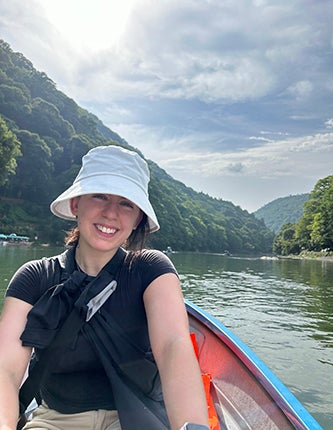
Bonjour à tous! It may come as a surprise, but in my English-speaking job I use my French degree every day. Since graduating from Rice in 2021 with a double major in French and history, I’ve worked as a Healthcare Consultant for Deloitte. In this role, I’ve had the opportunity to help health systems navigate ambiguity, contextualize their histories, and translate future goals to teammates and patients – all skills I developed while learning French. In class, I found myself amidst students with different terminologies and contexts describing their ideas in unfamiliar language. I find myself in the same situation today, counseling health system finance leaders on how to organize their workforce, human resource leaders on how to design a diversity, health equity, and environmental sustainability strategy, and CEOs on how to evolve their business to better meet patient needs. Oftentimes, I’m initially at a loss for what to share with leaders who have decades of experience in industries I’ve never worked in, with words and phrases that feel like a language of their own. In those moments, I’m comforted by the ample experience I gained in my French and Francophone courses that proved to me that no matter how alien a question may seem, with enough thought and clarification, I’ll be able to respond to it.
In the coming weeks, I’ll begin my Masters of Public Health at Harvard University with a focus in health policy. After researching the roots of maternal mortality in my French and Francophone courses and investigating this issue in Francophone Senegal, I’m confident I'll fully immerse myself in the new material and experiences I’ll find in Boston. À bientôt!
Karinna Romero
(Major in Psychology and Spanish, 2023)
I am excited to share that after graduating with a Bachelor of Arts in both psychology and Spanish, I am now beginning my career as an employee benefits associate account representative at USI Insurance in Las Vegas! While my career may not be directly tied to either of my majors, I strongly believe that my education has provided me with a well-rounded skill set that will contribute greatly to my success at USI Insurance. My experience as a Spanish major at Rice University has been particularly influential in shaping my perspective and preparing me for the diverse challenges of the professional world. Through engaging in discussions and analyzing both films and literature, I have developed a deep appreciation for cultural diversity and the importance of cross-cultural communication. This understanding will be invaluable as I interact with clients and colleagues from various backgrounds in Las Vegas. Furthermore, I am excited to continue exploring different cultures and traditions through travel, music, food, and literature. By doing so I aim to expand my horizons and continue to foster a sense of curiosity and appreciation for diverse perspectives. I am incredibly grateful for the education and support I received at Rice, which have paved the way for this exciting career opportunity.
Jack Sheehan
(Major in German Studies and Earth, Environmental and Planetary Sciences, 2022)

My name is Jack Sheehan and I graduated from Rice in 2022 with a BA in German Studies and a BS in Earth, Environmental and Planetary Sciences. I am now a PhD student at Harvard studying planetary science and mineral physics. I do a combination of experimental and computational work, studying planetary materials at extremely high pressures and temperatures. After my PhD I plan to apply for a postdoctoral research position in Germany, before eventually returning to the US to take a permanent research position in either government or industry.
My German major has already proven immensely helpful to my scientific career. Knowing German has allowed me to consider internships and research opportunities that I otherwise would not have known existed. Many early scientific papers are in German, and the ability to read them directly as they were written is invaluable. I’ve also been able to connect with German scientists; even without knowing all the technical terms related to their work, just making small talk with them in their native language is an excellent ice breaker! Additionally, the writing skills I developed while working on German-language essays carry over to English, allowing me to be a more effective communicator.
Susannah L. Wright
(Major in Classics, 2018)
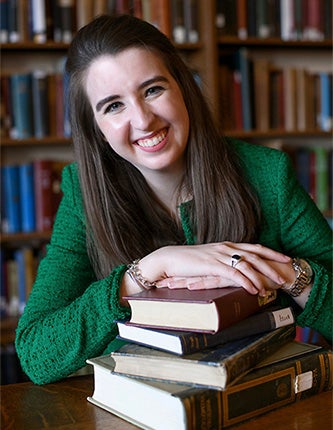
Upon graduating from Rice in 2018, I moved to Cambridge, MA, to begin a PhD in Classical Philology at Harvard University, where I am now entering my sixth and final year. During my time at Harvard, I have had the opportunity to learn from inspiring mentors and colleagues and to teach classes on Latin and Greek literature and mythology from Homer to the Middle Ages. I am currently completing a dissertation about the ways in which constraints of appropriateness determine how grief is represented in ancient and medieval Latin epic poetry. I am also continuing to collaborate with MCLC’s own Scott McGill on a verse translation of Virgil’s Aeneid, which was first conceived during my senior year at Rice and will be published by Norton in 2024–25 (with selections forthcoming in the Norton Anthology of World Literature this fall). As I prepare for the next phase of my career, I remain grateful beyond measure for the rigorous training, generous mentorship, and unflagging support I have received from MCLC faculty and staff during and since my time as a student. I will always be proud to be an alumna of this exceptional department and institution.
Event Highlights and Community Outreach
Lēnablou
The first international collaboration between MCLC/French program, at Rice University, and Villa Albertine was a resounding success. The Villa Albertine is an artistic residency that facilitates the creation of a network for arts and ideas spanning France and the United States. The Guadeloupean dancer, choreographer, and doctor of ethnochoreology (dance anthropology), Lénablou was in residence in March 2023 at Rice University. On March 10, 2023, Lénablou and the dancers of Open Dance Project offered a magical performance for the kick-off of the French Cultures Festival to a mesmerized audience. The Houston community, mainly people interested in French and Francophone culture, happily seized the opportunity to come to Rice and the Moody Center to attend the event. A dance workshop followed on March 11 at the Hunter Dancer Center. A dozen members of the Houston community attended this multigenerational event, which was also sponsored by Creative Ventures and the Humanities Research Center. Throughout her time in Houston, Lēnablou shared her dance and scholarly expertise around what she terms bigidi, how the unstable and off-balance (Black) body adapts to chaos. She generated meaningful discussions about the history and legacy of slavery, the transatlantic slave trade, and freedom and empowerment.
For more information, see bigidi.rice.edu and for more photos.
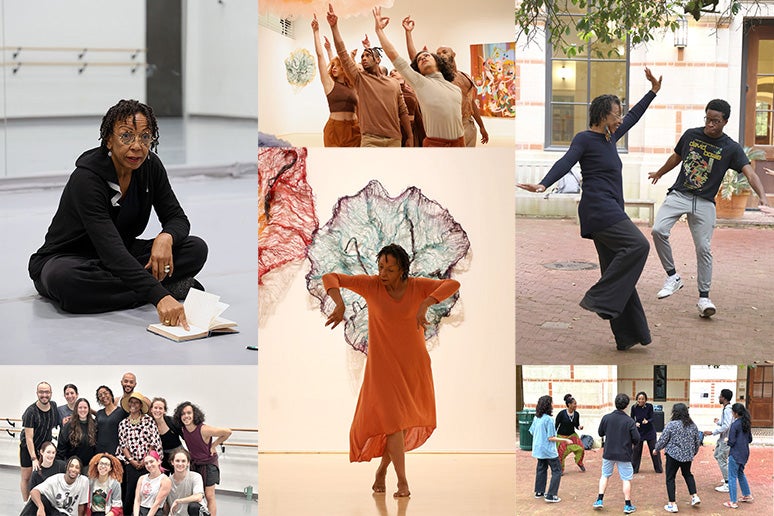
Rice Goes to the Grand Opera
Early in the 2022 fall semester, the French Consulate in Houston and the Houston Grand Opera reached out to the French Studies program faculty to offer the Rice community the exciting opportunity to attend Jules Massenet’s “Werther” (a French language opera)! French Club President Zach Zelman worked with Professor Jacqueline Couti and the Department of Modern and Classical Literatures and Cultures to sell and distribute discounted tickets across campus and offer several free tickets through a raffle. 88 students and some faculty members took advantage of this opportunity.
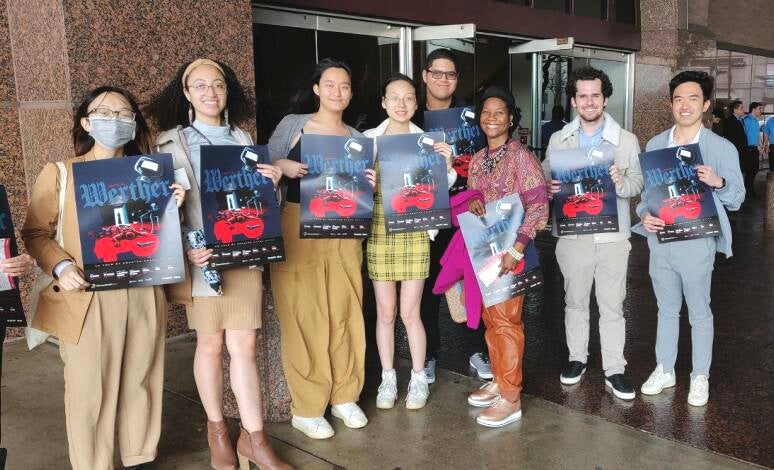
Study Abroad
Madrid and Barcelona Programs
Now more than ever, Rice students are eager to study abroad. Owing to the generosity of donors and friends of the humanities and arts, MCLC has been able to award fellowships to many students to study abroad and travel the world.
Awards and Fellowships
Owing to the generosity of donors and Friends of the Humanities and Arts, MCLC has been able to award fellowships to many students to study abroad and travel the world.
Bull Fellowships
- William Tsai – studied at the Institut d’Etudes Politiques (Sciences Po), Fall 2022
- Timothy Hayes – studied at American Universities, IAU, Aix-en-Provence, Summer 2023
- Talia Levy – research project partnered with the UC Berkeley Gump Station in French Polynesia on the island of Moorea, Summer 2023
- Sophia dos Santos – at the Institut d’Etudes Politiques (Sciences Po), Fall 2023
- Nancy Lindsey – at IES Abroad: French Language Immersion and Area Studies in Nantes, France, Fall 2023
- Catt Nguyen – at IES Abroad: French Language Immersion and Area Studies in Nantes, France, Fall 2023
- Chiro Ogbo – at American Universities, IAU, Aix-en-Provence, Fall 2023
- Saatchi Sagoo-Jones – will the Institut d'Etudes Politiques (Sciences Po), Fall 2023
Leipzig Fellowships
- Lucy Bozinov
- Ally Godsil
- Miguel Jiminez Gomez
- Logan Rossiter
Anita Kiperman Spanish Language Fund
- This new fund allowed students to go Spain In June and July 2023.
Barcelona Study Abroad
- Brendan Frizzell
- Saul Gonzalez
- Madeline Harrell
- Stephanie Martinez
Madrid Study Abroad
- Sofia Aran
- Blanca Chavez
- Delaney Miller
- Sean Nyangen
- Jose Ramirez
Acknowledgments
I would like to express my gratitude to the curriculum committee members, namely the MCLC program advisors. They did a fabulous job this year recruiting and advising students.
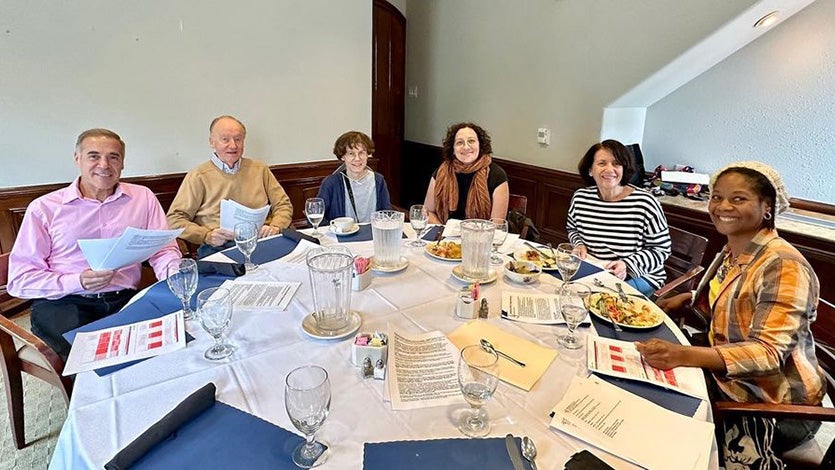
Stay in Touch
Do not hesitate to contact us to let us know what you have been doing since you graduated from Rice.
Follow us on Instagram @MCLCRice.

